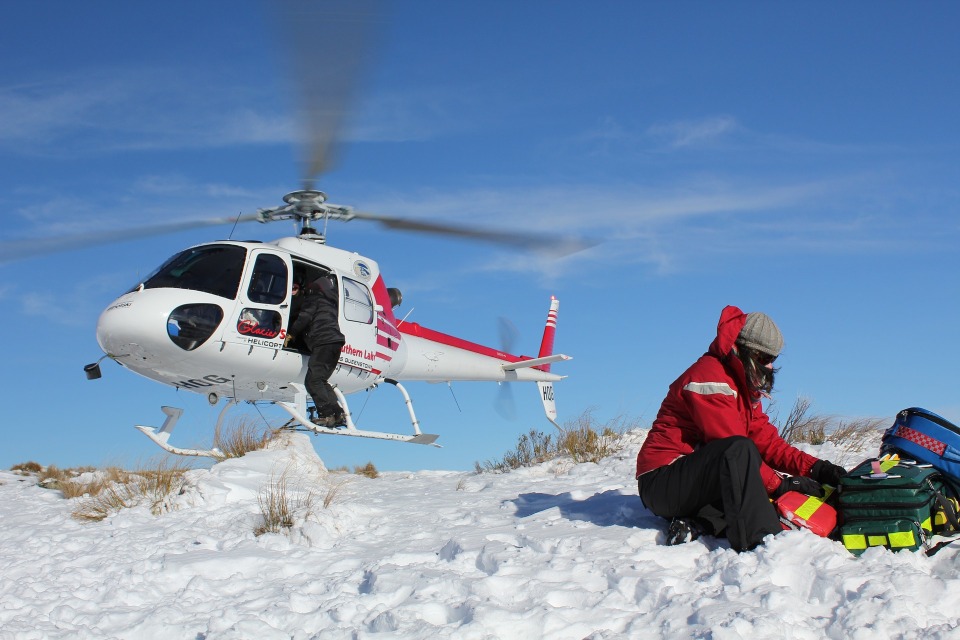What if Salvation is More Like an Ambulance Ride?

It started with a podcast. I’ve been mentioning Alisa Childers on my Facebook page and blog for a couple of months now. Her podcast and its interviews of various incredibly-smart-Christians has been rocking my brain. And I love it.
My husband, who also started listening to Alisa Childers, found this particular two-part series first. Consistent with his systematic approach to life, my husband started at the beginning and has been slowly working his way through the episodes in numerical order. My approach is more haphazard. Basically I just scroll through the options, see what sounds interesting, and listen to that.
Anyway, my husband asked if I’d listened to the podcasts on Molinism yet. He went on to say that he didn’t really like these episodes because they were complicated and confusing. He also didn’t think he agreed with the guest who seemed to say that everyone was saved unless they rejected Jesus.
What in the world was Molinism? I’d never heard of that before. I expected it to be some strange cult that Alisa and her guest were refuting, but my husband said that they appeared to agree with the theology. I skeptically checked out the podcasts the next day.
And I’ve been thinking and processing ever since.

Molinism refers to the teachings and theology of Luis de Molina, a Jesuit priest and scholar from Spain who lived in the 1500s. Molina was part of the Reformation, but unlike more well-known reformers such as Luther and Calvin, Luis de Molina chose to stay within the Catholic Church and try to reform it from the inside out. His attempts didn’t work since the Church rejected his teachings.
Molina attempted to reconcile the Scriptures that talk about free will with the Scriptures that also talk about the sovereignty of God. Rather than reject the idea of human free will, like John Calvin, Luis de Molina saw the opportunity for both. He suggested the concept of Middle Knowledge: that God not only knows everything that has and will happen, He also knows all of the “what ifs” that lie in-between. To put it in more modern terms, God knows all of the different timeline possibilities (thank you Avengers). Therefore, God is still sovereign and totally in control, but in at least some instances, He allows humans to choose. This concept is known as Libertarian Free Will.
This intense theological thinking definitely boggles my mind and I know it’s an intellectual stretch from some of my other blog posts. But, I really believe that wondering about theology is good for us! Paul told the Philippians to, “work out your own salvation with fear and trembling” (Philippians 2:12-13).
As I skeptically listened to the podcast episodes, Alisa and her guest, Tim Stratton, starting discussing analogies regarding salvation. They agreed that salvation is totally the work of God and tried to explain what little part we play in it. Alisa suggested that salvation is like a sick person going to the doctor and being given medicine. It’s their choice to take the medicine or not. But Tim wanted to take it a bit farther and this is where I’ve been stuck ever since.
He roughly quoted author Kenneth Keathley’s Ambulatory Model of Overcoming Grace. I know this because after I heard the episode, I looked it up. Here is the blog post on Tim Stratton’s website called FreeThinkingMinistries.com.
And here is Kenneth Keathley’s model in his own words.
“Imagine waking up to find you are being transported by an ambulance to the emergency room. It is clearly evident that your condition requires serious medical help. If you do nothing, you will be delivered to the hospital. However, if for whatever reason you demand to be let out, the driver will comply. He may express regret and give warnings, but he will still let you go. You receive no credit for being taken to the hospital, but you incur the blame for refusing the services of the ambulance.”
Tim Stratton, after discussing this ambulance model said these words that have embedded themselves in my brain ever since, “If you do nothing, they will save you.”

My brain struggled to reconcile this new idea with the theology I’d always been taught. But my heart resonated with a God who was this big and loving. I cried my way through the rest of the podcast.
The idea within this Molinistic view is that God’s grace and forgiveness is available to everyone. (Something I agree with.) We are able to resist God’s grace and reject Jesus. (Something I also agree with.) However, if we do not resist, God will bring us to the place where He saves us. (A new concept I am still wrestling with and yet find myself wanting to accept.)
If you do nothing, they will save you.
When I think about this Ambulance Model regarding personal salvation, I totally resonate with it. Waking up in an ambulance and allowing your EMT’s to take you to the hospital requires just a couple of minor things from you. First, you have to become aware that you are in trouble and need saving. And second, you have to recognize that these guys can save you. Then you have to let them. Is it just me, or does this just scream the Real Jesus?
It’s not Universalism, the idea that everyone goes to heaven no matter what, although I supposed people could take it that way. I am not a Universalist, nor do I intend to ever go there. I’m not saying that by doing nothing, or staying neutral, we will be saved. I still strongly believe Jesus’ words in John three.
“Whoever believes in him (Jesus) is not condemned, but whoever does not believe stands condemned already because they have not believed in the name of God’s one and only Son” John 3:18.
Jesus death on the cross is the only way to be saved. But, too often God gets viewed as distant and angry. Religious Christianity says that we need to do the right things in order to appease Him. Salvation becomes something we attempt to achieve by a series of correct behaviors.
What if the Divine Trinity is more like a team of EMT’s? They not only want to save us, they are fully capable of doing it. All we have to do is agree that we need saving and let them save us. Just do nothing.
“For it is by grace you have been saved, through faith—and this is not from yourselves, it is the gift of God— not by works, so that no one can boast” Ephesians 2:8-9.
As much as I adore this view of salvation, I also love this picture of sanctification. So much of our relationship, or rather our lack of a relationship, with God is based on resistance. Whether it’s lies we believe about Him or about ourselves, an idolatrous love of earthly things, or sin we refuse to let go of, it often feels impossible to change. But what if real life and healing is found in letting go? What if repentance is simply changing our mind and admitting that we need saving? If you do nothing, they will save you.
It’s also called surrender.

Could the Real God be so big, and so powerful, and so full of love, grace, and forgiveness that if we do nothing He will save us? From sin? From lies? From ourselves?
“For freedom Christ has set us free; stand firm therefore, and do not submit again to a yoke of slavery” Galatians 5:1.
My guess is that when we stop resisting, He will come close. He will do the work He has wanted to do for a long time. We will be amazed at His love and mercy, and His indescribable beauty will cause us to love Him in return. Because we love Him, we will want to obey Him and through that obedience we will experience even deeper closeness. By doing nothing, we will find the life that is truly life.
Imagine that you are on that gurney in the back of the ambulance. What does it look like for you to lie still and let the Holy Team of EMT’s save you?

0 Comments
Nicole Gardner
This closely expresses what I’ve come to believe about my salvation. In initially getting saved, it was very much like having been _*unconcious*_ up until I found myself immersed in the Gospel conversations that (3) others led me in. I mean, when you have no idea about the info that someone else is intentionally conversing with you to share, they (& mostly the Holy Spirit!!) direct that conversation to it’s crucial point. I just _*go along for the ride*_, whether it’s a one-on-one, a speaker, or a sermon. Becoming aware of _*where they’re going with that*_ is like waking-up to the significance of the talk. I also believe that every person every where (including unreached tribes out in the bush) are provided such “points” that they are to make a change in accord with what repentance that this pivot-point affords. Change to become Christlike, thereby choosing Him above themselves……….. e.g., “choosing Christ.”
The pitfalls I’ve experienced as a believer has involved me being BROUGHT to sanctification, seemingly circumstantially. The requirement that I MUST change from my sinful self co-exists with an awful lot of grace re. the entrenchment in those same things. I’m positive that grading is done with a handicap. God looks at where people are & where they come out of & takes this into consideration along with how Christlike they become. Jesus has it rough. Rougher than anyone. That’s as good a reason as any why God would never go ahead & credit anyone above another for having it easier than another (including Jesus). A guy limping with his leg shot-off in a war is going to get the full grade for letting his dog out to go potty. Whereas a track star with an agent to hook them up with making commercials might not even be saved even though giving half of their endorsement earnings to charity. An end comparison may just be God saying to the vet: “you ran well”, whereas, to the star whose legs were pumping on TVs everywhere: “you didn’t.” Because they were supposed to go do much further with what they had………… but put the stops on instead. Faith is faith.
Like Christy Lynne’s above theology says:
How far you need to go all depends, not only on where God WOULD take you, but even more on where He IS already taking you.
I agree with what you’re saying 100% 💕💕💕💕💕💕💕💕.
Christy Lynne Wood
I love your comment! You seem to be grasping my heart. (There was some confusion on my Facebook page this morning. 😆) Thanks for sharing!!
Nicole Gardner
This blogpost really helped me today. I was fully set up to be in funk all weekend, but this focusing on God’s gracious sovereignty is really helping me!
Christy Lynne Wood
Love it!! ❤️
michalskisgreatadventure
I think you have some great points in this post, and in the way that you are taking it all in! I think it’s also important, though, not to stay focused too entirely on the “do nothing” part, specifically…Surrender is so key, the desire to put aside our will (in that aspect of doing nothing), in favor of God’s will in all things! But as we do that, God will lead us on a very real journey of both applying our will and our action to His will…It all stems from our surrender to Him – For it is God which worketh in you both to will and to do of his good pleasure. (Philippians 2:13, KJV) – for as we submit to Him, God gives us the will to do His will through conviction, and the ability to do His will even when it’s hard through the power of the in-dwelling Holy Spirit…And yet, if we stay too focused on the specific part of “doing nothing,” we could actually talk ourselves right into the rejection that we were trying to avoid when we began to surrender! The end result of this line of reasoning is that, if we do nothing at all, God will put everything in our hearts – but we know that we do have to be ready not only to hear God’s word, but to do what it says, so it is an active faith. The reason it’s hard to come up with a precise analogy for salvation is that the concept is God-sized and our understanding is human-limited…And our life is a journey of continuing to balance each of the absolute truths that God gives us in His word about salvation; not necessarily to reconcile them, as our human approach demands, but to accept His every truth as absolute truth, especially when it’s beyond us. Salvation is absolutely free, and absolutely of His sovereignty alone – therefore, we must absolutely surrender and cast ourselves upon His mercy. Salvation is active, it absolutely requires our will, conformed to God’s will, our active response and continual choice – therefore, we must absolutely act in absolute surrender. And that’s why we only continue in this path through constant application to God, in the name of Jesus, through the power of the Holy Spirit…A narrow path, where straying to the right or to the left is destruction, but we are held tight by an all-power God who is perfect love, if we accept His offer…It should always be mind-boggling, we should never think we fully grasp it, and we should continue searching out all the nuances of meaning that help us apply ourselves to His great truth more and more each day!
Christy Lynne Wood
Thanks for posting your thoughts. I absolutely agree that surrender is just a part of discipleship. Obedience is a huge part too…as long as we are obeying out of love and not to check off a list of good behavior. This whole journey with God is such a process!
TS00
I might suggest that you ambulance analogy applies more to the sanctification of a child of God than the new birth. While the salvation ambulance – ark – was prepared for all, no one wakes up to find himself inside. He or she is, instead, provided with many warnings and pleas to enter into the only salvation from sure destruction.
The example as you framed it sounds a little too Calvinistically determinist, but that might just be me. 😉 While I do agree with your belief that God loves all, and would gladly rescue all, he does give us a clear and conscious choice. He does not put us in the ambulance and force us to beg off, but opens wide the door and begs us to come in for the help we so desperately need. It is that choice that leads us to put our trust in Christ, and from that point on, we are indeed assured of receiving all of the treatment, support and help we need.
DoneWithReligion
Interesting. I had never heard this view either but certainly worth thinking about. Thanks for sharing this.